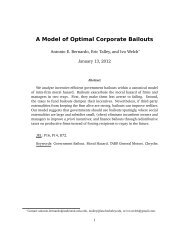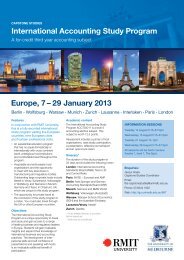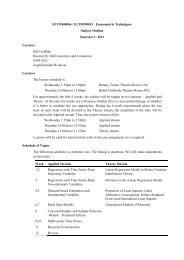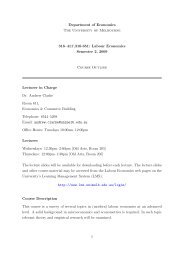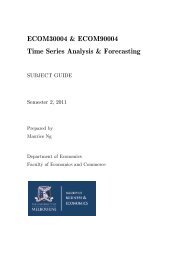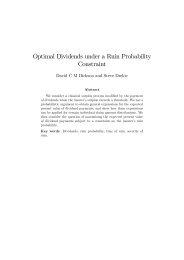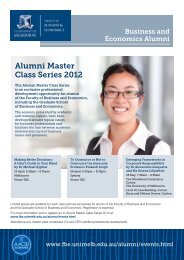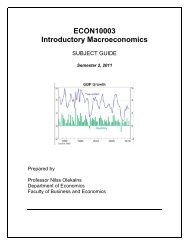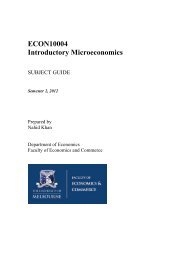Course Planning Guide 2012 - Faculty of Business and Economics
Course Planning Guide 2012 - Faculty of Business and Economics
Course Planning Guide 2012 - Faculty of Business and Economics
You also want an ePaper? Increase the reach of your titles
YUMPU automatically turns print PDFs into web optimized ePapers that Google loves.
Study areas<br />
Accounting<br />
Accounting in today’s business world is extremely sophisticated. An accountant is a strategic adviser <strong>and</strong> business partner<br />
who must have a good underst<strong>and</strong>ing <strong>of</strong> business issues <strong>and</strong> processes, as well as the skills necessary for sound decision<br />
making.<br />
Accounting studies will equip you to underst<strong>and</strong> the financial structure <strong>of</strong> an organisation <strong>and</strong> produce <strong>and</strong> analyse financial<br />
information. Accounting graduates usually focus on one or more <strong>of</strong> the following areas:<br />
ÆÆ<br />
Financial Accounting is about the external reporting <strong>of</strong> a company’s financial position <strong>and</strong> performance. Financial accounting<br />
information is used in making investment decisions <strong>and</strong> is widely used to value businesses <strong>and</strong> predict corporate success<br />
<strong>and</strong> failure.<br />
ÆÆ<br />
Management Accounting provides information to managers to help them measure <strong>and</strong> control processes within their<br />
business in a successful <strong>and</strong> pr<strong>of</strong>itable manner. It aids managers in strategy implementation, costing <strong>of</strong> new products <strong>and</strong><br />
services, evaluation <strong>of</strong> the value added by different areas within a business <strong>and</strong> managing their performance.<br />
ÆÆ<br />
Auditing <strong>and</strong> Assurance Services is about monitoring <strong>and</strong> adding credibility to the external reporting disclosures made by<br />
companies. In addition, assurance services add credibility to non-financial information e.g. environmental reporting,<br />
customer-satisfaction surveys, internet reporting <strong>and</strong> even the Oscar count.<br />
Accreditation<br />
To practise as a pr<strong>of</strong>essional accountant in Australia, graduates are required to become a member <strong>of</strong> one <strong>of</strong> the three pr<strong>of</strong>essional<br />
accounting bodies: Certified Practising Accountants Australia, the Institute <strong>of</strong> Chartered Accountants in Australia or the Institute<br />
<strong>of</strong> Public Accountants (IPA). Holders <strong>of</strong> the Bachelor <strong>of</strong> Commerce degree may apply for membership to pr<strong>of</strong>essional accounting<br />
bodies. Accreditation requirements can vary from year to year <strong>and</strong> you are strongly advised to check the websites <strong>of</strong> the respective<br />
pr<strong>of</strong>essional accounting body for information on the requirements for the year in which you commenced your BCom. Further<br />
information about accounting accreditation is available at www.accounting.unimelb.edu.au/teach/pr<strong>of</strong>f.html<br />
Major in Accounting<br />
To obtain a major in accounting you will need to complete the following level-3 accounting subjects:<br />
Actuarial studies<br />
Actuaries work in the assessment, evaluation <strong>and</strong> management <strong>of</strong> the financial risks faced by insurance companies,<br />
superannuation funds <strong>and</strong> other entities. These risks include illness, disability or death <strong>of</strong> individuals, risks to property,<br />
<strong>and</strong> also major catastrophes or economic changes. The actuary’s work is based on a multi-disciplinary background in<br />
mathematics, statistics, demography, finance <strong>and</strong> economics.<br />
These subjects, plus actuarial modelling for life insurance, superannuation <strong>and</strong> general insurance, form the basis <strong>of</strong> the actuarial<br />
stream in the BCom degree. Students learn a variety <strong>of</strong> skills, foremost amongst which are mathematical modelling <strong>and</strong> computing,<br />
which enable them to move into a variety <strong>of</strong> industry positions in the insurance <strong>and</strong> finance sectors, <strong>and</strong> elsewhere.<br />
In Australia, there are currently 2700 actuaries (partly or fully qualified). About 21% <strong>of</strong> these actuaries work in life insurance, 9%<br />
work in superannuation, 19% work in general insurance, <strong>and</strong> the remainder are employed in finance <strong>and</strong> investment, management,<br />
government service <strong>and</strong> universities. Many Australian qualified actuaries work overseas.<br />
Accreditation<br />
The Centre for Actuarial Studies is accredited by the Institute <strong>of</strong> Actuaries <strong>of</strong> Australia, which is the pr<strong>of</strong>essional actuarial body<br />
in Australia. This accreditation means that students who complete certain subjects at the University <strong>of</strong> Melbourne, <strong>and</strong> achieve<br />
a sufficiently high st<strong>and</strong>ard, will be recommended for exemption from the corresponding subjects <strong>of</strong> the Institute <strong>of</strong> Actuaries <strong>of</strong><br />
Australia. Further details are available in the Students’ <strong>Guide</strong> <strong>2012</strong> on the Centre for Actuarial Studies website:<br />
www.economics.unimelb.edu.au/actwww/ugradCurrent.shtml<br />
Major in Actuarial Studies<br />
To obtain a major in actuarial studies you will need to complete 37.5 level-3 points chosen from the following subjects:<br />
ÆÆ<br />
ACTL30001 Actuarial Modelling I<br />
ÆÆ<br />
ACTL30002 Actuarial Modelling II<br />
ÆÆ<br />
ACTL30003 Contingencies<br />
ÆÆ<br />
ACTL30004 Actuarial Statistics<br />
ÆÆ<br />
ACTL30005 Models for Insurance <strong>and</strong> Finance<br />
ÆÆ<br />
ACTL30006 Financial Mathematics III<br />
Please check the prerequisites for these subjects at www.unimelb.edu.au/h<strong>and</strong>book<br />
ÆÆ<br />
ACCT30001 Financial Accounting<br />
ÆÆ<br />
ACCT30002 Enterprise Performance Management<br />
ÆÆ<br />
ACCT30004 Auditing <strong>and</strong> Assurance Services<br />
Please check the prerequisites for these subjects at www.unimelb.edu.au/h<strong>and</strong>book<br />
11<br />
12



